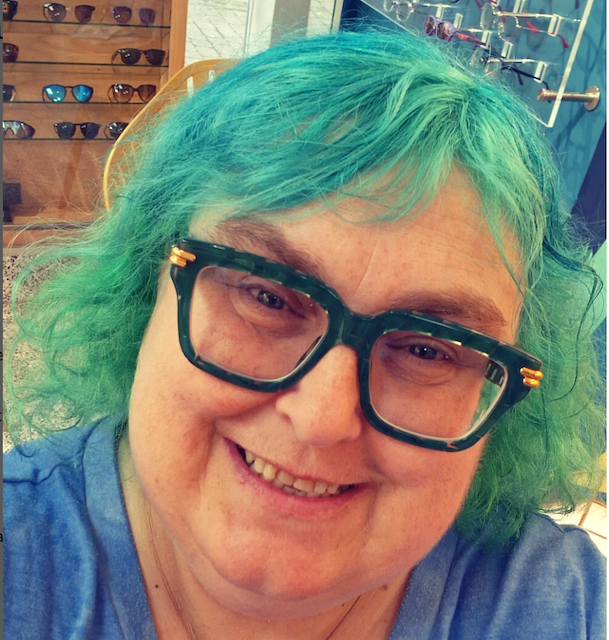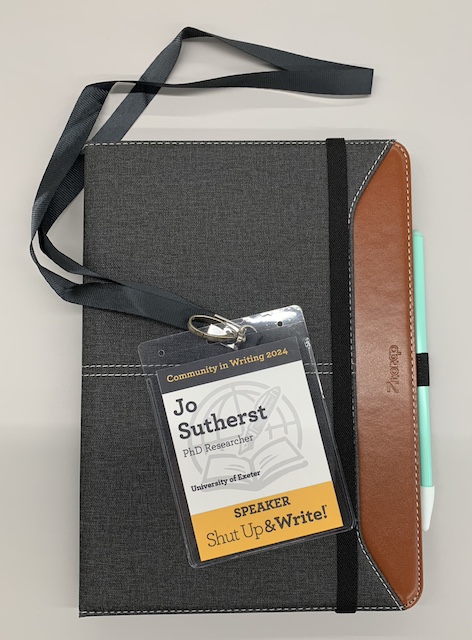Jo Sutherst reflects on the Writing for All Panel at the “Shut Up and Write! Community in Writing Symposium 2024
As I gear up for my first conference talk of 2025, I find myself reminiscing about one of my favourite experiences from last year. Attending the “Shut Up and Write! Community in Writing Symposium 2024” at the University of Cambridge was truly unforgettable. Being invited to speak on the panel “Writing for All: Accessibility and Neurodiversity in SUAW[i]” was not only an honour but also a chance to engage in a conversation that I am passionate about, inclusivity in writing groups. Guided by Professor Inger Mewburn (known as The Thesis Whisperer) from the Australian National University, the panel discussions were about creating writing spaces that embrace diverse needs and celebrate neurodiversity.
The panel (and indeed the wider symposium) was a melting pot of ideas and innovations, with many aimed at how we can make writing spaces more inclusive. Tyler Shores from the Think Lab Program at Cambridge, one of my fellow panellists, spoke with passion about the importance of incorporating neurodivergent-friendly practices in Shut Up and Write! Sessions, highlighting how shared experiences can create an environment where everyone feels valued and supported.
Another enlightening perspective came from Alief Doğan, a recent PhD graduate who shared her journey from academia to tech, and her work on a neurodiversity report with the BBC. Her vision for making information more accessible to a broad audience was both inspiring and practical.
Adding a unique touch, Dr. Stephanie Zihms from Glasgow Caledonian University talked about her innovative writing retreats held on trains. She demonstrated how dynamic environments can spark creativity and particularly benefit neurodivergent individuals, allowing them to step away from conventional routines.
The Power of Body Doubling
In my part of the discussion, I shared insights from my experience of being part of and co-ordinating the PGR Study Space (formerly PGR SUAW) at the University of Exeter, where we have built a vibrant writing community. Starting with in-person meetings in 2017, PGR writing groups gradually evolved into a hybrid setup post-pandemic. Over this time, I have witnessed the benefits of writing groups and body doubling, a practice where people work alongside each other, often virtually, to boost focus and productivity.
Our transition to Microsoft Teams during lockdown opened up new opportunities. In 2022, we were able to launch a daily Teams workspace from 8 am to 10:30 pm, which accommodates various schedules and preferences. This flexible setup supports those with atypical work patterns, caring responsibilities, or living in different time zones.
The main advantage of body doubling is the sense of accountability and reduced isolation it offers. Knowing that others are working alongside you can enhance motivation and focus, helping to push through procrastination. This concept resonates well with neurodivergent individuals, especially those with ADHD like myself, who find consistency and camaraderie helpful.
Creating an Inclusive Environment
Our PGR Study Space’s success lies in its inclusivity and sense of community. We offer a variety of session formats, from silent writing to facilitated discussions, all catering to individual preferences. This environment empowers members to engage at their comfort level, whether actively participating or observing from the background. I’m particularly proud of how these sessions have reduced stigma around neurodiversity within the PGR community. During my time with the writing group, I have noticed a cultural shift where members can openly discuss their challenges, creating a supportive environment that celebrates diverse cognitive approaches.
Reflections
Participating in this panel and sharing my experiences was both affirming and inspiring. The attendees’ response highlighted the ongoing need to advocate for accessible writing spaces that embrace both neurotypical and neurodivergent individuals. As our PGR Study Space community expands, I am committed to evolving these practices, ensuring every PGR feels welcome and supported. The symposium and my experience on the panel has underscored that writing is a personal journey, and inclusivity isn’t just beneficial, it’s essential for everyone to thrive. Whether through body doubling or flexible writing sessions, the PGR Study Space at the University of Exeter strives to create spaces where everyone feels empowered to succeed.
Join Us
I invite any PGRs interested in finding a regular writing environment to join our diverse and supportive PGR Study Space community. Your experiences and ideas will be invaluable and contribute to the rich tapestry of what makes writing, especially writing alongside others, a transformative process. If you’re interested in learning more or joining our community, feel free to reach out. Together, we can make writing accessible and enjoyable for all.
[i] SUAW = Shut Up and Write

Jo is a part-time PhD researcher in Art History and Visual Culture at the University of Exeter, exploring how artists use social media as a space to redefine authenticity and authority in the art world. Her research explores the impact on cultural narratives and power structures. With a background in professional photography, her research builds on identity themes from her MA project, “Fractured Identities”. She actively coordinates the PGR Study Space group at Exeter, fostering a collaborative writing environment for postgraduate researchers.

